Learn about popular antioxidant rich ingredients to add to your smoothies for a quick and healthy boost of nutrition!
Antioxidants are nature’s defense mechanism against harmful free radicals, unstable molecules that can damage our cells and contribute to aging and diseases. These powerful compounds are found in a variety of foods, especially in fruits, vegetables, and certain seeds and spices. Consuming a diet rich in antioxidants is essential for maintaining optimal health and preventing a range of chronic diseases.

Smoothies offer a delightful and convenient way to ensure we get our daily dose of these vital compounds. By blending together a mix of antioxidant-rich ingredients, we can create delicious beverages that not only satisfy our taste buds but also fortify our bodies against cellular damage. Here are some of the key benefits of antioxidants:
- Combat Free Radicals: Antioxidants neutralize free radicals, preventing them from causing cellular damage.
- Support Skin Health: They help maintain youthful skin by reducing the damage caused by UV rays and pollution.
- Boost Immune System: Antioxidants strengthen the immune system, helping the body fight off illnesses.
- Promote Heart Health: They play a role in reducing cholesterol and preventing heart diseases.
- Enhance Brain Function: Antioxidants can reduce oxidative stress in the brain, potentially lowering the risk of neurodegenerative diseases.
- Reduce Inflammation: Many antioxidants have anti-inflammatory properties, which can help alleviate symptoms of various inflammatory conditions.
With these benefits in mind, let’s take a look at 10 antioxidant-rich ingredients that you can seamlessly incorporate into your smoothies.
Table of Contents
Blueberries
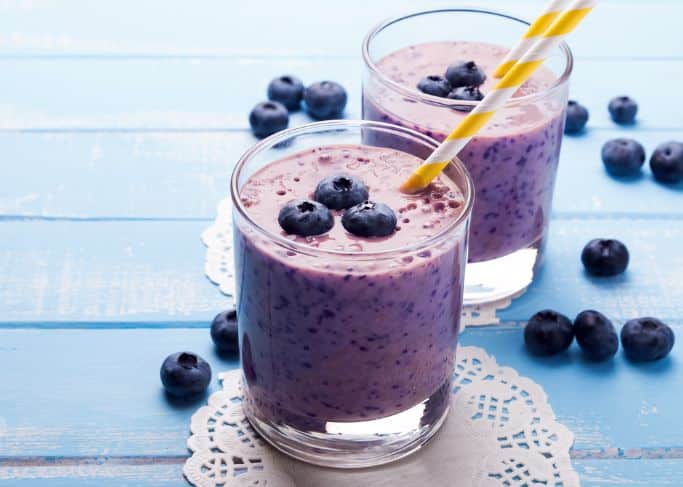
Blueberries, often referred to as nature’s candy, are not just delicious but also rank among the top foods with the highest antioxidant content. These small, vibrant berries are native to North America and have been consumed for centuries, both for their delightful taste and their myriad health benefits.
The primary antioxidants found in blueberries are anthocyanins, the compounds responsible for their characteristic deep blue hue. But the benefits of blueberries extend beyond just their anthocyanin content:
- Brain Health: According to Scientific American, regular consumption of blueberries has been linked to improved cognitive function. Studies suggest that the antioxidants in blueberries can delay age-related cognitive decline, enhance memory, and even boost neural connections.
- Heart Health: Blueberries are beneficial for heart health. They can improve cholesterol levels, reduce blood pressure, and enhance the elasticity of arteries, thereby promoting better blood flow.
- Anti-inflammatory Properties: Chronic inflammation is a root cause of many diseases. The antioxidants in blueberries help reduce inflammation, potentially lowering the risk of disorders associated with it.
- Skin Health: The vitamin C and other antioxidants in blueberries support skin health by combating the damage caused by sun, pollution, and harmful free radicals. This can lead to reduced signs of aging and a more youthful complexion.
- Digestive Health: Blueberries are a good source of dietary fiber, which promotes healthy digestion and can aid in maintaining a healthy gut microbiome.
When adding blueberries to your smoothies, you can use them fresh or frozen. Both forms retain their antioxidant properties. Moreover, blending them into smoothies ensures that you consume the whole fruit, including the skin, which is where many of the antioxidants are concentrated. Whether you’re looking for a sweet touch to your morning drink or aiming to boost its nutritional profile, blueberries are a versatile and health-packed choice.
Try a blueberry smoothie with protein after a workout, this blueberry oatmeal smoothie for breakfast, or a refreshing blueberry pear smoothie on a hot summer day.
Spinach
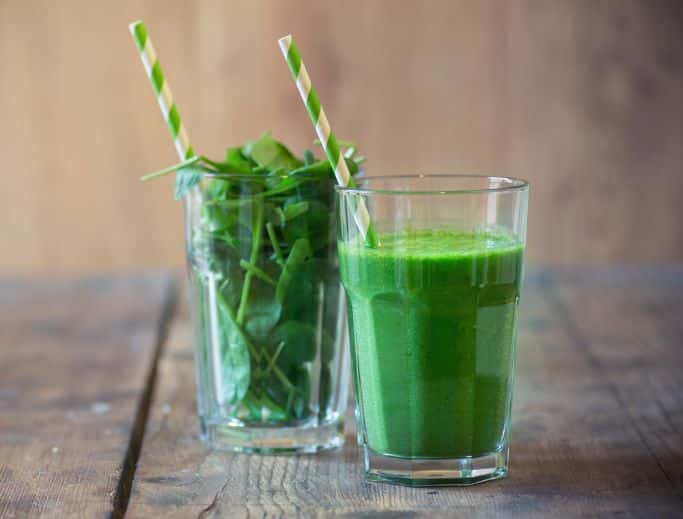
Spinach, a leafy green vegetable that has been a staple in various cuisines around the world, is more than just a simple salad ingredient. This versatile green is packed with a plethora of nutrients and antioxidants, making it an excellent addition to any diet, especially when blended into smoothies.
Spinach is:
- Rich in Vitamins and Minerals: Spinach is a powerhouse of essential vitamins and minerals. It’s particularly high in vitamin C, vitamin E, and beta-carotene, all of which are potent antioxidants. These compounds play a pivotal role in protecting our cells from oxidative damage caused by free radicals.
- Eye Health: Spinach contains two essential antioxidants, lutein and zeaxanthin, which are concentrated in the eyes. These compounds help shield the eyes from harmful high-energy light waves like ultraviolet rays. Per the Seattle Times, regular consumption of spinach can reduce the risk of macular degeneration and cataracts, two common age-related eye conditions.
- Bone Health: Spinach is a good source of vitamin K, which is vital for maintaining bone health. Vitamin K acts as a modifier of bone matrix proteins, improving calcium absorption, and reducing urinary excretion of calcium.
- Anti-cancer Properties: The antioxidants and other compounds in spinach have been studied for their potential anti-cancer properties. Spinach contains chlorophyll, which may block the carcinogenic effects of heterocyclic amines, compounds formed when grilling foods at high temperatures.
- Blood Pressure Regulation: Spinach is high in potassium and low in sodium, a combination that’s beneficial for maintaining healthy blood pressure levels. Additionally, the nitrates in spinach have been found to help dilate blood vessels, promoting better blood flow and reducing blood pressure.
- Improved Digestion: The dietary fiber in spinach aids in digestion, preventing constipation and promoting a healthy digestive tract. This fiber also feeds the beneficial bacteria in the gut, supporting a balanced microbiome.
When incorporating spinach into your smoothies, it’s easy to blend and has a mild flavor that can be easily masked by fruits or other ingredients. This makes it an ideal choice for those who might be hesitant about adding greens to their drinks.
Fresh or frozen, spinach retains its nutrient content, ensuring that you’re getting a healthy dose of antioxidants with every sip. So, the next time you’re crafting a smoothie, don’t forget to toss in a handful of this nutrient-dense leafy green.
Our blueberry spinach smoothie and peach spinach smoothie are great choices to try!
Chia Seeds
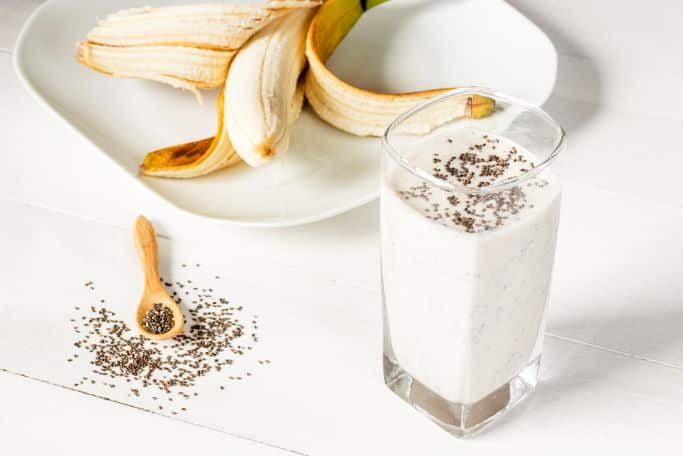
Chia seeds, tiny black and white seeds derived from the Salvia hispanica plant native to Central America, have gained immense popularity in recent years as a superfood. Despite their small size, chia seeds are a nutritional powerhouse, offering a myriad of health benefits, especially when it comes to their antioxidant content.
Here’s a comprehensive look at the wonders of chia seeds:
- Potent Antioxidants: Chia seeds are rich in antioxidants, particularly flavonoids. These antioxidants help combat oxidative stress in the body, reducing inflammation and protecting against a variety of chronic diseases. The antioxidants also play a role in preserving the seeds, allowing them to have a long shelf life without going rancid.
- Heart Health: Chia seeds are an excellent source of omega-3 fatty acids, specifically alpha-linolenic acid (ALA). Omega-3s are known for their role in reducing bad cholesterol, inflammation, and improving heart health. Regular consumption of chia seeds can contribute to a balanced lipid profile, potentially reducing the risk of cardiovascular diseases.
- Digestive Health: One of the standout features of chia seeds is their impressive fiber content. When exposed to liquids, chia seeds can absorb up to 10-12 times their weight, forming a gel-like consistency. This property not only makes them great for creating puddings but also aids in digestion. The soluble fiber helps in promoting bowel regularity and fostering a healthy gut microbiome.
- Bone Health: Chia seeds are a good source of calcium, phosphorus, and magnesium, all essential minerals for maintaining strong and healthy bones. For individuals who don’t consume dairy, chia seeds can be an alternative source of calcium.
- Blood Sugar Regulation: The combination of healthy fats, protein, and fiber in chia seeds can help stabilize blood sugar levels. They slow down the digestion and absorption of carbohydrates, leading to a steady release of energy and preventing blood sugar spikes.
- Weight Management: Due to their high fiber content and ability to absorb water, chia seeds can help in weight management. When consumed, they expand in the stomach, increasing the feeling of fullness and reducing overall calorie intake.
When adding chia seeds to smoothies, they can be incorporated in both whole and ground forms. They impart a slightly nutty flavor and a unique texture, especially if allowed to sit and gel. For those looking to thicken their smoothies or simply boost their nutritional content, chia seeds are a versatile and healthful addition.
Whether you’re aiming for a creamy texture or seeking a nutrient boost, chia seeds are a worthy inclusion in any smoothie recipe, like this creamy chia strawberry smoothie.
Kale
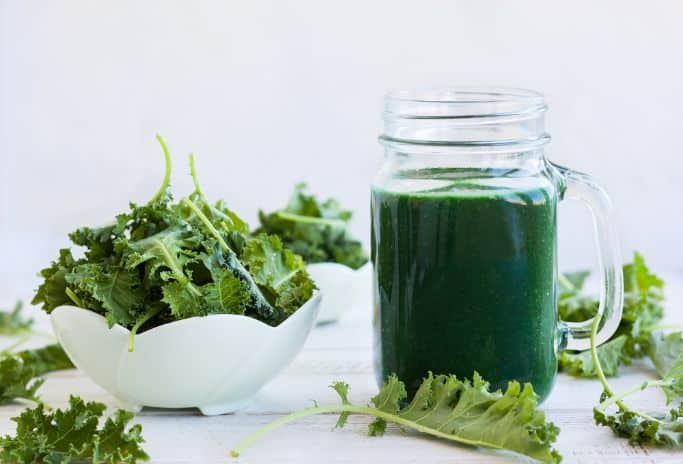
Kale, a member of the cabbage family, has rightfully earned its title as a superfood. With its dark green, curly leaves and robust nutritional profile, kale has become a favorite among health enthusiasts and chefs alike. While it’s often associated with salads and chips, kale’s versatility extends to smoothies, where its nutrient density can elevate any blend to a healthful concoction.
Here’s an in-depth exploration of the benefits of kale:
- Diverse Antioxidants: Kale is a treasure trove of antioxidants, including vitamins A, C, and K, as well as quercetin and kaempferol. These compounds help combat oxidative stress, reducing the risk of chronic diseases and promoting overall health. Vitamin K, in particular, plays a crucial role in blood clotting and bone health.
- Eye Health: Just like spinach, kale is rich in the antioxidants lutein and zeaxanthin. These compounds accumulate in the retina, protecting the eyes from harmful light and oxidative damage. Regular consumption of kale can help reduce the risk of age-related macular degeneration and cataracts.
- Detoxification: Kale contains compounds called glucosinolates, which are broken down into biologically active compounds that help in the detoxification process. These compounds support liver function and assist in the elimination of toxins from the body.
- Anti-inflammatory Properties: Chronic inflammation is linked to many health issues, from arthritis to heart disease. Kale’s rich omega-3 fatty acid content, specifically alpha-linolenic acid, helps counteract inflammation, potentially reducing the risk of associated diseases.
- Heart Health: Kale promotes heart health in multiple ways. It’s high in dietary fiber, which helps lower cholesterol levels. Additionally, the potassium and magnesium in kale support healthy blood pressure levels, reducing the risk of cardiovascular diseases.
- Bone Health: Kale is a valuable source of calcium, an essential mineral for maintaining strong bones and teeth. For those who are lactose intolerant or choose not to consume dairy, kale offers an alternative source of this vital mineral.
- Immune Support: The high vitamin C content in kale boosts the immune system, enhancing the body’s ability to fight off infections and illnesses. Vitamin C also promotes healthy skin by aiding in collagen production.
When incorporating kale into smoothies, it’s best to remove the tough stems and use the tender leaves. While kale has a slightly bitter and peppery flavor, this can be easily balanced with the sweetness of fruits or the creaminess of yogurt in a smoothie.
Cacao Powder

Cacao powder, derived from the cacao bean, is the raw, unprocessed version of what eventually becomes the chocolate we all know and love. This rich, dark powder is not just a treat for the taste buds but also a nutritional gem. Unlike its more processed counterpart, cocoa, cacao retains a higher concentration of antioxidants and nutrients, making it a preferred choice for health enthusiasts.
Let’s delve deeper into the myriad benefits of cacao powder:
- Flavonoid Rich: Cacao is particularly high in flavonoids, a group of polyphenol antioxidants. These compounds have been studied extensively for their potential to reduce inflammation, improve blood flow, and protect the heart, per Healthline. Regular consumption of cacao flavonoids can lead to improved cardiovascular health and reduced risk of heart diseases.
- Mood Enhancer: Cacao contains several compounds that can boost mood and cognitive function. Among them are phenylethylamine (PEA), which can promote feelings of well-being and happiness, and theobromine, a mild stimulant that can enhance alertness without the jitters associated with caffeine.
- Mineral Dense: Cacao powder is a rich source of essential minerals like magnesium, iron, potassium, and calcium. Magnesium, in particular, plays a role in over 300 enzymatic reactions in the body, including energy production and muscle function.
- Skin Health: The antioxidants in cacao can help protect the skin from oxidative damage caused by UV rays. This can lead to reduced signs of aging, such as wrinkles and age spots. Additionally, the improved blood flow from flavonoid consumption can enhance skin hydration and complexion.
- Digestive Health: Cacao powder contains a good amount of dietary fiber, which aids in digestion. This fiber promotes regular bowel movements and supports a healthy gut microbiome.
- Blood Pressure Regulation: The flavonoids in cacao have been shown to improve nitric oxide levels in the blood, leading to blood vessel dilation. This can result in reduced blood pressure and better overall vascular function.
When incorporating cacao powder into smoothies, it’s essential to differentiate between cacao and regular cocoa powder. While both come from the same source, cacao is less processed and thus retains more of its nutritional benefits.
A spoonful or two can transform your smoothie into a chocolatey delight, replete with health benefits. For those seeking a balance between indulgence and nutrition, cacao powder offers the best of both worlds.
Raspberries
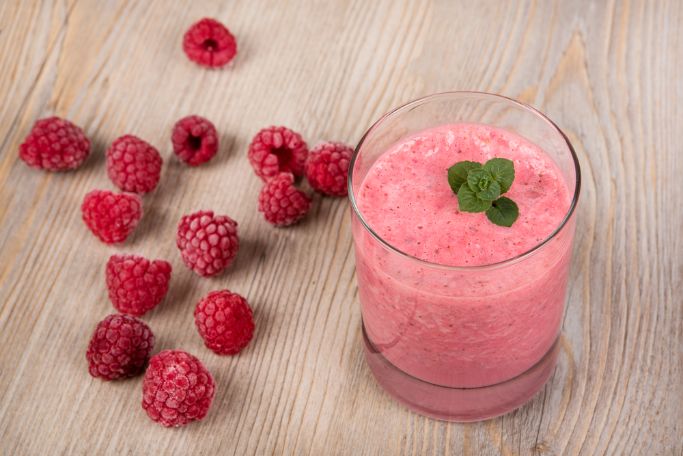
Raspberries, with their vibrant color and tantalizingly sweet-tart flavor, are more than just a delightful fruit to the palate. These small, delicate berries are a nutritional dynamo, packed with a range of vitamins, minerals, and antioxidants that offer a multitude of health benefits.
Here’s a look at the wonders of raspberries:
- Antioxidant Powerhouse: Raspberries are rich in antioxidants, particularly quercetin, ellagic acid, and the anthocyanins that give them their distinctive red hue. These compounds help neutralize harmful free radicals in the body, reducing oxidative stress and the risk of chronic diseases.
- Anti-inflammatory Properties: Chronic inflammation is a precursor to many health issues. The antioxidants in raspberries, especially ellagic acid, have been shown to have anti-inflammatory effects, potentially reducing the risk of diseases associated with inflammation, such as arthritis and heart disease.
- Cancer Prevention: Raspberries contain compounds that have been studied for their potential anti-cancer properties. Ellagic acid, in particular, has been shown to inhibit the growth of cancer cells and promote the death of certain cancer cells.
- Digestive Health: Raspberries are an excellent source of dietary fiber, which aids in digestion and promotes gut health. The fiber in raspberries can help prevent constipation, maintain a healthy gut microbiome, and even aid in weight management by promoting feelings of fullness.
- Heart Health: The potassium and fiber in raspberries support heart health. Potassium helps regulate blood pressure, while dietary fiber can reduce the absorption of cholesterol, leading to improved cholesterol levels.
- Skin Health: The vitamin C content in raspberries plays a crucial role in collagen synthesis, which is vital for skin elasticity and health. Regular consumption can lead to radiant skin and reduced signs of aging.
- Blood Sugar Regulation: Raspberries have a low glycemic index, meaning they have a minimal impact on blood sugar when consumed. The fiber in raspberries also slows down the digestion of sugars, leading to a more gradual release of glucose into the bloodstream.
When adding raspberries to smoothies, they can be used fresh or frozen. Both forms retain the berry’s nutritional benefits. Their sweet-tart flavor profile can elevate the taste of your smoothie, making it both refreshing and healthful.
Try this orange raspberry smoothie or our double berry smoothie to get some of these healthy berries in your diet!
Green Tea
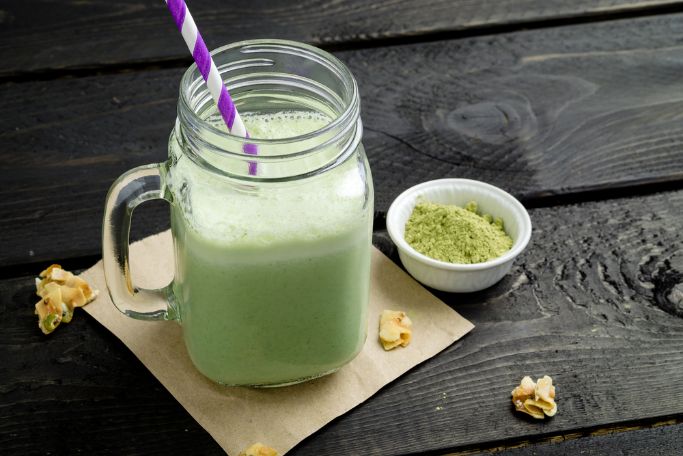
Green tea, originating from the Camellia sinensis plant, has been consumed for centuries across Asia, not just for its subtle flavor but also for its myriad health benefits. Unlike black or oolong teas, green tea leaves are not oxidized, allowing them to retain a higher concentration of antioxidants and beneficial compounds. When brewed and added to smoothies, green tea introduces a unique flavor profile and a host of nutritional advantages.
Here are just a few benefits of green tea:
- Rich in Catechins: Green tea is particularly high in catechins, a type of antioxidant. Among them, epigallocatechin gallate (EGCG) stands out as the most potent and beneficial. EGCG has been extensively studied for its potential to combat inflammation, inhibit the growth of certain cancer cells, and support overall health.
- Brain Health: Green tea contains compounds that can cross the blood-brain barrier, offering neuroprotective effects. The combination of caffeine and L-theanine in green tea has been shown to improve cognitive function, enhance mood, and increase alertness without causing the jitters commonly associated with coffee.
- Metabolic Boost: Green tea can enhance metabolic rate and increase fat oxidation, making it a popular choice for those looking to manage their weight. The combination of caffeine and catechins in green tea has been linked to modest weight loss and improved metabolic health.
- Heart Health: Regular consumption of green tea has been associated with a reduced risk of cardiovascular diseases. It helps in lowering levels of bad cholesterol and improving the ratio of good cholesterol to bad cholesterol. Additionally, the antioxidants in green tea protect the heart by neutralizing harmful free radicals.
- Oral Health: The catechins in green tea have antibacterial properties that can inhibit the growth of bacteria in the mouth, potentially reducing the risk of bad breath and oral infections.
- Skin Health: The polyphenols in green tea can protect the skin from the harmful effects of ultraviolet rays, one of the leading causes of premature skin aging. Topical application and dietary consumption of green tea have both been associated with improved skin health.
- Blood Pressure Regulation: Regular consumption of green tea has been linked to reduced blood pressure levels, likely due to its positive effects on blood vessel function and its rich antioxidant content.
When incorporating green tea into smoothies, it’s best to use freshly brewed and cooled tea to ensure maximum nutrient retention. The mild, earthy flavor of green tea can complement a variety of ingredients, from fruits to vegetables, making it a versatile addition to any smoothie.
Turmeric
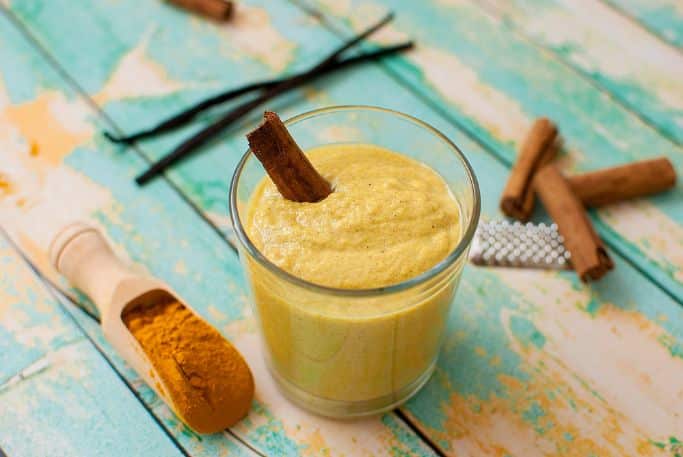
Turmeric, a golden-hued spice derived from the root of the Curcuma longa plant, has been a cornerstone of traditional medicine and culinary practices in Asia, particularly in India, for thousands of years. Its vibrant color, earthy aroma, and slightly bitter taste are unmistakable. Beyond its culinary applications, turmeric is revered for its potent medicinal properties, primarily attributed to a compound called curcumin.
Here’s an in-depth look at the benefits of turmeric:
- Potent Anti-inflammatory: Curcumin, the primary active compound in turmeric, has powerful anti-inflammatory effects, according to Johns Hopkins. It can match the effectiveness of some anti-inflammatory drugs without the side effects. Chronic inflammation is linked to many modern diseases, making turmeric’s ability to combat it particularly valuable.
- Antioxidant Boost: Turmeric is not only rich in antioxidants itself but also boosts the body’s own antioxidant enzymes. This dual action makes it particularly effective in neutralizing harmful free radicals, which play a role in aging and many chronic diseases.
- Brain Functionality: Curcumin has been shown to increase levels of brain-derived neurotrophic factor (BDNF), a growth hormone that functions in the brain. This can delay or even reverse brain diseases and age-related decreases in brain function. Additionally, it may improve memory and cognitive function.
- Heart Health: Turmeric improves the function of the endothelium, the lining of the blood vessels, which plays a pivotal role in heart health. By enhancing endothelial function, turmeric can help regulate blood pressure and reduce the risk of cardiovascular diseases.
- Natural Antidepressant: Some promising research suggests that curcumin can boost serotonin and dopamine levels in the brain, potentially serving as a natural remedy for depressive disorders.
- Joint Health: Given its potent anti-inflammatory properties, turmeric can be a natural remedy for arthritis patients. Regular consumption can reduce symptoms of pain and inflammation associated with joint diseases.
- Digestive Aid: Turmeric can promote healthy digestion and alleviate digestive issues. It stimulates the gallbladder to produce bile, which can improve digestion. Additionally, its anti-inflammatory and antioxidant properties can protect the digestive tract from damage.
When adding turmeric to smoothies, a little goes a long way. Just a pinch or a small teaspoon can impart its benefits. To enhance the absorption of curcumin, it’s often recommended to pair turmeric with black pepper, which contains piperine, a compound that boosts curcumin absorption by up to 2000%.
The earthy flavor of turmeric pairs well with various fruits, vegetables, and dairy or non-dairy bases, making it a versatile addition to any smoothie blend. Whether you’re aiming for a health boost, an anti-inflammatory kick, or just a splash of color, turmeric is a spice worth incorporating.
Strawberries
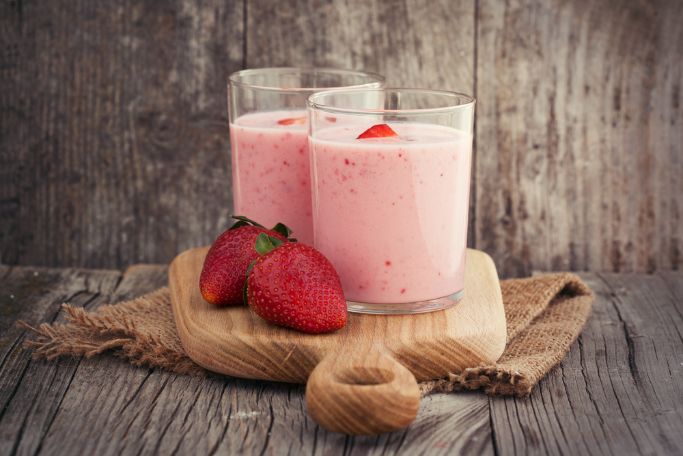
Strawberries, with their heart-shaped silhouette, vibrant red hue, and sweet, juicy taste, are among the most beloved fruits worldwide. I know they’re MY favorite! Beyond their delightful flavor, strawberries pack a nutritional punch, making them a favorite not just among gourmets but also health enthusiasts. These berries are a treasure trove of vitamins, minerals, and antioxidants.
Some of the benefits of strawberries are:
- Rich in Antioxidants: Per Healthline, strawberries are a fantastic source of antioxidants, including vitamin C, quercetin, and anthocyanins. These compounds help combat oxidative stress, reducing the risk of chronic diseases and promoting overall health. Vitamin C, in particular, strengthens the immune system, aids in collagen production, and enhances iron absorption.
- Heart Health: The anthocyanins in strawberries have been linked to improved heart health. Regular consumption of strawberries can reduce LDL cholesterol levels, improve arterial function, and regulate blood pressure, all of which contribute to cardiovascular well-being.
- Anti-inflammatory Properties: Chronic inflammation is associated with numerous health issues. The antioxidants and polyphenols in strawberries can help reduce inflammation, potentially lowering the risk of disorders like arthritis and heart disease.
- Blood Sugar Regulation: Strawberries have a low glycemic index, meaning they release sugar into the bloodstream slowly. This, combined with their fiber content, helps stabilize blood sugar levels, making them a suitable choice for those monitoring their blood sugar.
- Skin Health: The vitamin C and other antioxidants in strawberries play a pivotal role in skin health. They protect the skin from UV damage, reduce signs of aging, and promote a radiant complexion.
- Digestive Health: Strawberries are a good source of dietary fiber, which aids in digestion. This fiber promotes regular bowel movements, supports a healthy gut microbiome, and can aid in weight management by promoting feelings of fullness.
- Cancer Prevention: The ellagic acid and other compounds in strawberries have been studied for their potential anti-cancer properties. They may inhibit the growth of cancer cells and reduce the progression of tumor formations.
When incorporating strawberries into smoothies, they can be used fresh or frozen. Both forms retain the berry’s nutritional benefits, and their natural sweetness often eliminates the need for added sugars. Their versatile flavor profile pairs well with a variety of ingredients, from other fruits and vegetables to dairy or non-dairy bases.
Whether you’re looking for a refreshing summer drink (like this strawberry watermelon smoothie), a post-workout treat, or a nutrient-packed breakfast (try our banana strawberry green smoothie), strawberries are a delightful and healthful addition to any smoothie blend.
Acai Berries
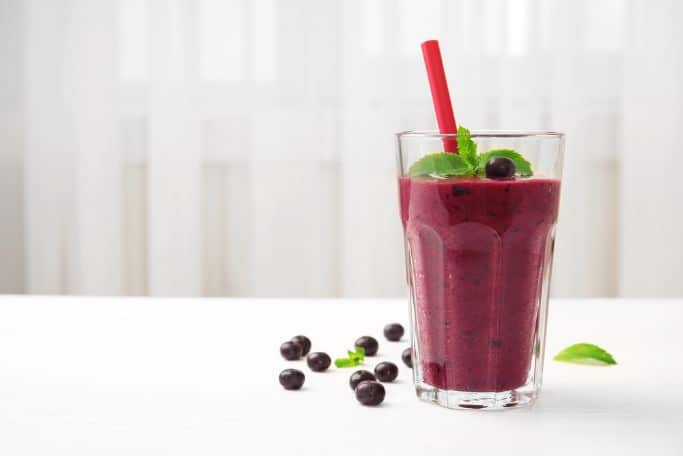
Acai berries, small dark purple fruits harvested from the acai palm tree native to the rainforests of South America, have surged in popularity in recent years, especially in the realm of health and wellness. Often labeled as a superfood, these berries are not just known for their unique, earthy flavor but also for their impressive array of nutrients and antioxidants.
Acai berries are beneficial in these ways:
- Antioxidant Powerhouse: Acai berries are exceptionally rich in antioxidants, especially anthocyanins, which give them their deep purple color. These antioxidants combat oxidative stress in the body, neutralizing free radicals and reducing the risk of chronic diseases.
- Heart Health: Acai berries are rich in plant sterols that provide cardio-protective benefits, such as improving overall blood circulation, relaxing blood vessels, and reducing blood cholesterol. The high anthocyanin content in the berries has also been linked to improved cholesterol levels and overall heart health.
- Brain Health: The compounds in acai berries can protect the brain from damage as it ages. They counteract the inflammation and oxidation that can impair cognitive and motor functions, potentially reducing the risk of neurodegenerative diseases.
- Anti-cancer Properties: The polyphenolic compounds in acai berries have been studied for their role in inhibiting the growth and spread of cancer cells, particularly in relation to leukemia and ovarian cancer.
- Skin Health: The antioxidants in acai berries can help maintain youthful skin. They combat the oxidative damage caused by environmental pollutants and UV rays, reducing signs of aging and promoting a radiant complexion.
- Digestive Health: Acai berries are a source of dietary fiber, which promotes a healthy digestive system. This fiber aids in regular bowel movements and supports a balanced gut microbiome.
- Energy and Stamina Boost: While not a direct source of significant energy, the nutrients in acai berries can help reduce fatigue and increase overall stamina. They also aid in the recovery process post-exercise.
- Immune System Support: The vitamin C and polyphenolic compounds in acai berries can boost the immune system, enhancing the body’s ability to fend off infections and illnesses.
When incorporating acai berries into smoothies, they are often available in the form of frozen puree or powdered supplements, as the berries are highly perishable and don’t transport well. Both forms retain the nutritional benefits of the fruit.
Acai has a unique flavor profile, often described as a blend of wild berries and chocolate, making it a delightful addition to smoothie recipes. Whether you’re crafting a classic acai bowl or blending a nutrient-rich drink, acai berries offer a combination of taste and health benefits that’s hard to beat.
Boosting your smoothies with antioxidant-rich ingredients is a simple and delicious way to enhance their nutritional value. By incorporating blueberries, spinach, chia seeds, kale, cacao powder, raspberries, green tea, turmeric, strawberries, and acai berries, you can create antioxidant-packed smoothies that not only taste great but also support your overall health. Experiment with different combinations and enjoy the benefits of these powerful antioxidants in every sip.




Leave a Reply